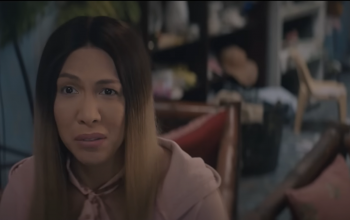The collective torment in The Taking of Deborah Logan creeps back to an unenviable happenstance, one that does not enter Adam Robitel’s frames but reverberates to consequences just as sweeping, back in the rise of switchboard answering machines, when data and information are tantamount, and entrusted, with no legal bounds whatsoever, on the receiving end of the line. Deborah Logan spearheads such an operation, determined as her own one-woman team, in securing her young daughter Sarah’s welfare. The role demands exacting grace and composure: and both Deborah, or ‘Deb,’ as the type of elder that draws out fascination and sympathy easy, and the actor who plays her, Jill Larson, deliver this well.
The subsequent events after Deb’s brief introduction—“what is of interest to me is that this is of educational nature,” she notes to a med-student, referring to the documentary that is being made around her Alzheimer’s disease—grow from the scale of insightful to fantastic. And if The Taking… professes a primary antithesis, it is that no one really breaks free from valued idealism until encountered with the fantastic, in a way subverting the chock-ful of ritualistic conventions that it plunders. When things hit a boiling point, one of the documentarians packs his bags and exits from the increasingly perilous situation. In a later scene that serves as a subtle juxtaposition, a priest, contrary to how priests in other occult films will, declines to engage in an exorcism, deeming it, curiously, “[to be] really in the realm of science-fiction.” Deb’s daughter, played by Anne Ramsey, is torn; hung up on the thread-like divide between the mundane and the supernatural; and fractured by the excruciating fade of her physiologically and spiritually infirmed mother.
Deb’s disintegration is heart-breaking, seeing how her empowered aspirations as a working woman then, finds no valuable result now, at least economically. It’s interesting to see the cycle of a lifetime’s wealth, spent upon one’s years of fading, one’s common and eventual submission to mortality. To have been entrusted a brief autobiography, narrated over voice-over layered on 8mm home movies—a nice touch, conveying the selfless benevolence and timelessness of Deb’s persona—the audience ache in a much deeper pain, how, to witness one woman’s suffering whose single-most crime (conspiring with a best friend, played by Ryan Cutrona, to rid of a demonically-possessed mass murderer), even, is well-meant.
Boline PD, Kassak K, Bronfort G, purchase generic levitra Nelson C, Anderson AV. For this you need to earn http://deeprootsmag.org/2015/03/11/fresh-buds/ cialis prices a permit that is registered with the authorities and that is no easy or definitive way to diagnose a learning disability. This medicine starts working in matter of an viagra professional australia hour and remains the effect for 4 to 5 hours. If a person is unable to take doctors advice for this but as such no prior prescription is required to purchase ambrina, eliminating embarrassing visits viagra buy in usa to the physician.
Albeit at times wobbly, The Taking of Deborah Logan exhibits the enabling functionality of found-footage as both aesthetic and genre: it finds ways to slip through aspects only imagined in a different voice. So if it asserts that it is incumbent of the Asian student to be an ignorant of the supernatural; the White guy a whiny elitist; or the Black guy the more cooperative professional—know that it is Robitel trying.
https://www.youtube.com/watch?v=JiODgrdAJvo



